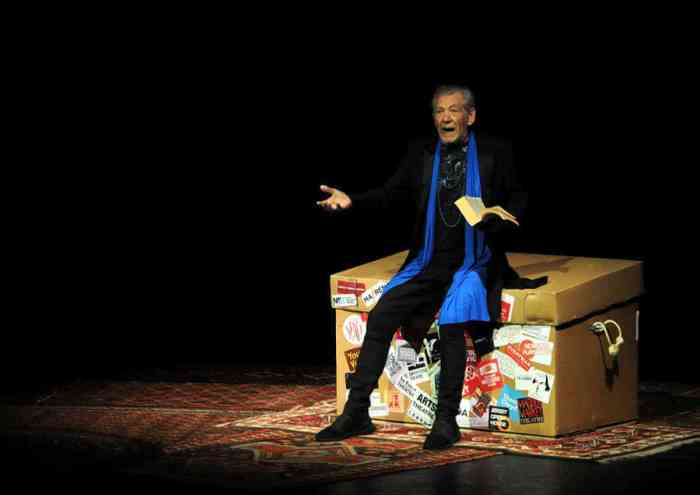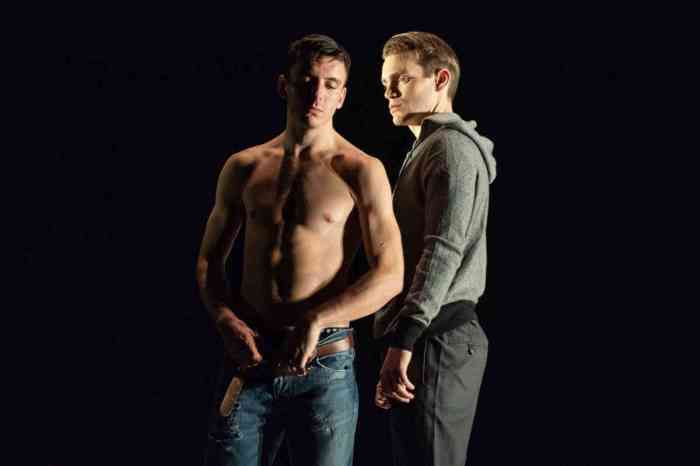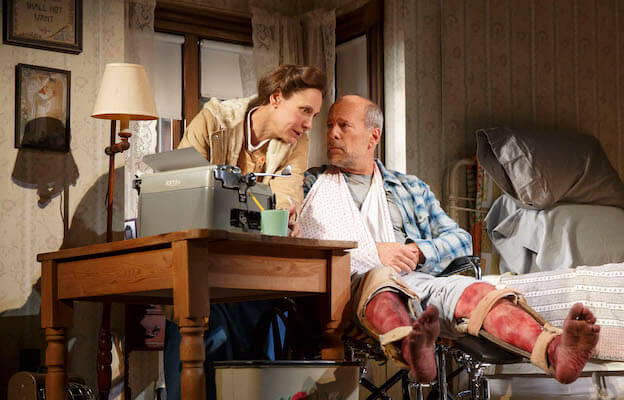Ralph Fiennes in “Man and Superman,” directed by Simon Goodwin. | JOHAN PERSSON
As one of the more scientifically-minded characters I saw on the London stage this month might say, let’s start with what you can see. NT Live is transmitting the National Theatre's sold-out hits to cinemas in New York and around the world (ntlive.com for venues and schedule).
First on your list should be Ralph Fiennes’ incandescent performance as the rebellious Jack Tanner (and Don Juan) in Simon Goodwin’s modern dress “Man and Superman” at the National’s Lyttelton (on stage to May 17 and on NT Live) more than a century after Bernard Shaw dazzled audiences eager to be scandalized with his verbal pyrotechnics. It remains a brainy battle of sexes, beliefs, and politics.
The play is a wonderful ensemble work, notable for Shaw’s strong women created in pre-Suffrage days and played deftly here by Indira Varma and Faye Castelow. And Nicholas Le Prevost is a memorable foil for Tanner as Roebuck Ramsden, both stodgy and sprightly at the same time. Unmissable.
A new Tom Stoppard play is always an event –– especially directed by Nick Hytner in his swan song as the artistic director of the National after a 12-year run that can only be described as stupendous. (He is an out gay man, to boot.) “The Hard Problem” at the National’s new Dorfman (to May 27 and on NT Live) is not Stoppard’s best, but it is packed with challenging ideas on the nature of consciousness and what it means to be a human animal.
Set mostly in an institute for brain science, the play centers on a young, conflicted scientist, Hilary (Olivia Vinall), with a soft spot for God. She does not seem a great choice for a protagonist for these weighty matters, but her ambivalence is part of Stoppard’s point. More interesting is the side plot on the ludicrousness of modern financial markets featuring a villainous hedge fund manager (Anthony Calf) who also funds the institute.
Olivia Vinall in Tom Stoppard’s “The Hard Problem.” | JOHAN PERSSON
Also coming our way through NT Live is David Hare’s new “Behind the Beautiful Forevers” at the Olivier to May 5, directed by the National’s new artistic director, Rufus Norris, and based on Katherine Boo’s deep journalistic exploration of a slum next to Mumbai’s airport and how the poor there eke out enough to survive –– if they are lucky –– from garbage-picking while being exploited by the police and local “fixers.” “They want to get rid of us,” one mother says. “That is the only power we have.”
The brilliant ensemble led by Meera Syal as the pivotal mother Zehrunisa Husain sucks us in to this alien world that most of us manage to avoid thinking about, but they never sentimentalize the real people who they are portraying in scenes that out-Dickens Dickens. I went to an exhibit at the British Library for the 800th anniversary of Magna Carta (recommended) and it is clear that its principles of equal justice have not filtered down to this benighted corner of the former empire. Hare’s play is hard to watch, but well worth the confrontation with uncomfortable truths.
At the innovative Park Theatre is “Dead Sheep” (to May 9) by political reporter Jonathan Maitland, a first-time playwright, and directed by veteran Ian Talbot. It’s about Geoffrey Howe, the colorless number two to Margaret Thatcher who brought her down with a damning speech in her presence in the House of Commons. James Wilby, who bravely took the title role in the 1987 Merchant-Ivory film of E.M. Forster’s gay-themed “Maurice” when others turned it down, portrays this politician –– belittled with the title of this play –– with dignity. His break with Thatcher, abetted by wife Elspeth (Jill Baker) –– who comes across as someone who would make a good prime minister –– is over Thatcher’s aversion to union with Europe.
Thatcher is played by Steve Nallon, famous for voicing the Thatcher puppet on TV’s satiric “Spitting Image”. Here he plays her straight without campiness and is quite as good as Meryl Streep was as “The Iron Lady.” A huge photo of Thatcher and her all-male cabinet of 23 looms over the proceedings and multiple male Tories are limned ably by Graham Seed, Tim Wallers, and John Wark.
Maitland’s next also at the Park, June 1–July 11, is “An Audience with Jimmy Savile” about the late TV icon, once “the most trusted man in Britain” who turned out to be the most twisted man in the country, serially molesting children throughout his entire career.
Meera Syal in Katherine Boo’s “Behind the Beautiful Forevers.” | RICHARD HUBERT SMITH
I love the Finborough pub theater and looked forward to its revival of that smash hit of the 1850s “Our American Cousin” (which closed April 14). Forgive me for having considered Abe Lincoln lucky in not having to sit through the whole play. Lydia Parker put together a talented and game cast for this farce about an American rube (Solomon Mousley as Asa) coming to England to claim his inheritance from aristocratic relatives, but I spent most of my time trying to imagine how stuff like this could ever have been very funny. Even the line John Wilkes Booth used to time his assassin’s shot because it would be covered by a sure laugh fell flat. But Tom Taylor’s play is of deep historical interest and I am glad to have it off my bucket list. And to be fair, the Great Emancipator was said be enjoying it on that fateful evening 150 years ago this month.
Mike Bartlett has provoked us with “Cock” about bisexuality and “Charles III” about Charles succeeding his mother Queen Elizabeth II a few years hence. At the estimable Almeida, he served up an ugly stunt, “Game” (now closed), where people pay £250 to shoot a stun gun at a young, lower class couple in a swanky pad they get to live in as payment for their exploitation. While well acted, there must be other ways to remind us of the depths to which our society has sunk.
I saw two family plays that made “August Osage County” look like a picnic. The first was Sam Holcroft’s “Rules for Living” about an upper middle class family of grown children gathering with their parents for the Christmas dinner from hell (at the National’s Dorfman to July 8). They are in an arena having what amounts to a tag-team wrestling match, replete with an actual scoreboard tallying the points they score upon one another.
All hands in this good cast are on deck under Marianne Elliott’s direction, from feckless son Adam (the always entertaining Stephen Mangan) to Deborah Findlay’s manic mom. This play, likely to make you feel as if you have nothing to complain about in terms of going home for the holidays, gives new meaning to the term food riot.
Steve Nallon as Margaret Thatcher in Jonathan Maitland’s“Dead Sheep.” | DARREN BELL
Tony Kushner showed us a dad telling his grown kids of his intent to kill himself in “The Intelligent Homosexual’s Guide…” a few seasons back at the Public. At the Tricycle (to May 2), it’s Mom’s turn in April De Angelis’ “After Electra,” a boulevard comedy about old-age suicide with a fine ensemble under the nimble direction of Sam West. It opens with 81-year-old modern artist Virgie (Marty Cruickshank) on her birthday telling her dour, mid-50’s daughter Haydn (Veronica Roberts) and subsequently her sister and closest friends that she will end her life that evening.
Virgie is not dying of acute cancer or anything; she just feels herself slipping and wants to make her exit before she flops. The argument she gets from her loved ones makes the play, posing some serious philosophical questions. (Virgie to Haydn: “How long was this supposed to go on — this ‘mother’ thing?”) But De Angelis also can’t resist the kind of morbid jokes Woody Allen might tell (Virgie: “I thought seeing you all might make me want to change my mind, or at least waiver a bit. But it’s the opposite.”).
Especially good is Virgie’s sister, Shirley (Rachel Bell), an imperious but earthy member of the House of Lords who gets many of the best lines in the way Maggie Smith does as the dowager countess on “Downton Abbey.”
At the command of human rights activist Peter Tatchell, I went to see “Dara” (now closed) at the National’s Lyttelton, an epic play about warring Muslim Mughal princes in 17th century India. I am glad I did, if only to witness one of the most stirring pleas for religious pluralism I have heard in my life from the lips of Prince Dara (Zubin Varla in a titanic performance) on trial for being a bad Muslim. As we work today to combat religious bigots who pervert their faiths to gain political power, “Dara” reminds us that it is a timeless story. Lines like “Who cares what door you open to come into the light?” are still fighting words for many.
David R. Butler and Alexander Hulme in Dylan Costello’s “The Glass Protégé” | KRISZTIAN SIPOS PHOTOGRAPHY
I’m not supposed to review “Gypsy” starring that force of nature Imelda Staunton (“Pride”) at the Savoy (to July 18) because I saw a preview, but I can’t imagine its producers would be upset if I told you that it is one of the greatest productions of the Styne-Sondheim-Laurents musical of all time.
COMING UP: At the National: “Everyman” at the Olivier, Rufus Norris’ debut directorial effort as artistic director of the National starring Chiwetel Ejiofor of “Twelve Years a Slave” (to July 16); Caryl Churchill’s “Light Shining in Buckinghamshire” (to June 22); “The Beaux’ Stratagem” by George Farquhar at the Olivier (May 19-July 19). At the Park, Dylan Costello's “The Glass Protégé” (to May 9) about gay Hollywood in the late 1940s and “Positive” (July 7-August 1) about living with HIV today. At the Arts, Jonathan Harvey’s classic of teen gay love, “Beautiful Thing” (June 3-July 11). At the Noël Coward (May 9-July 18), the great Antony Sher in “Death of a Salesman,” already a hit at the RSC in Stratford. At the Tricycle, the well-reviewed “The Father” (May 7-June 13) by Florian Zeller makes its London debut. “A New Play for the General Election” by Chris New is just that at the Finborough (to May 12, with a special May 7 performance on UK Election Night).







































